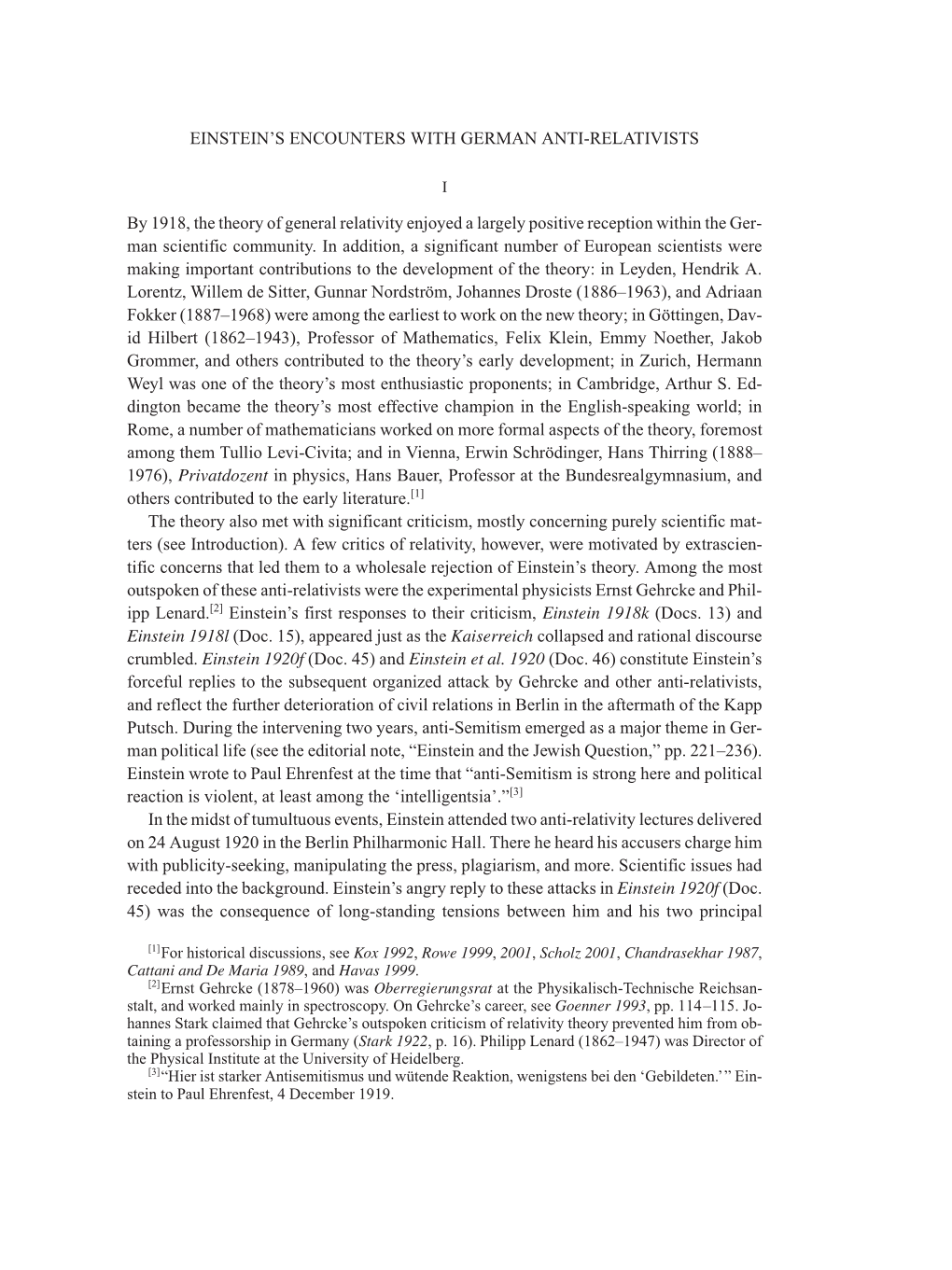G E R M A N A N T I - R E L AT I V I S T S 1 0 1
EINSTEIN’S ENCOUNTERS WITH GERMAN ANTI-RELATIVISTS
I
By 1918, the theory of general relativity enjoyed a largely positive reception within the Ger-
man scientific community. In addition, a significant number of European scientists were
making important contributions to the development of the theory: in Leyden, Hendrik A.
Lorentz, Willem de Sitter, Gunnar Nordström, Johannes Droste (1886–1963), and Adriaan
Fokker (1887–1968) were among the earliest to work on the new theory; in Göttingen, Dav-
id Hilbert (1862–1943), Professor of Mathematics, Felix Klein, Emmy Noether, Jakob
Grommer, and others contributed to the theory’s early development; in Zurich, Hermann
Weyl was one of the theory’s most enthusiastic proponents; in Cambridge, Arthur S. Ed-
dington became the theory’s most effective champion in the English-speaking world; in
Rome, a number of mathematicians worked on more formal aspects of the theory, foremost
among them Tullio Levi-Civita; and in Vienna, Erwin Schrödinger, Hans Thirring (1888–
1976), Privatdozent in physics, Hans Bauer, Professor at the Bundesrealgymnasium, and
others contributed to the early
literature.[1]
The theory also met with significant criticism, mostly concerning purely scientific mat-
ters (see Introduction). A few critics of relativity, however, were motivated by extrascien-
tific concerns that led them to a wholesale rejection of Einstein’s theory. Among the most
outspoken of these anti-relativists were the experimental physicists Ernst Gehrcke and Phil-
ipp
Lenard.[2]
Einstein’s first responses to their criticism, Einstein 1918k (Docs. 13) and
Einstein 1918l (Doc. 15), appeared just as the Kaiserreich collapsed and rational discourse
crumbled. Einstein 1920f (Doc. 45) and Einstein et al. 1920 (Doc. 46) constitute Einstein’s
forceful replies to the subsequent organized attack by Gehrcke and other anti-relativists,
and reflect the further deterioration of civil relations in Berlin in the aftermath of the Kapp
Putsch. During the intervening two years, anti-Semitism emerged as a major theme in Ger-
man political life (see the editorial note, “Einstein and the Jewish Question,” pp. 221–236).
Einstein wrote to Paul Ehrenfest at the time that “anti-Semitism is strong here and political
reaction is violent, at least among the
‘intelligentsia’.”[3]
In the midst of tumultuous events, Einstein attended two anti-relativity lectures delivered
on 24 August 1920 in the Berlin Philharmonic Hall. There he heard his accusers charge him
with publicity-seeking, manipulating the press, plagiarism, and more. Scientific issues had
receded into the background. Einstein’s angry reply to these attacks in Einstein 1920f (Doc.
45) was the consequence of long-standing tensions between him and his two principal
[1]For historical discussions, see Kox 1992, Rowe 1999, 2001, Scholz 2001, Chandrasekhar 1987,
Cattani and De Maria 1989, and Havas 1999.
[2]Ernst Gehrcke (1878–1960) was Oberregierungsrat at the Physikalisch-Technische Reichsan-
stalt, and worked mainly in spectroscopy. On Gehrcke’s career, see Goenner 1993, pp. 114–115. Jo-
hannes Stark claimed that Gehrcke’s outspoken criticism of relativity theory prevented him from ob-
taining a professorship in Germany (Stark 1922, p. 16). Philipp Lenard (1862–1947) was Director of
the Physical Institute at the University of Heidelberg.
[3]“Hier ist starker Antisemitismus und wütende Reaktion, wenigstens bei den ‘Gebildeten.’” Ein-
stein to Paul Ehrenfest, 4 December 1919.
